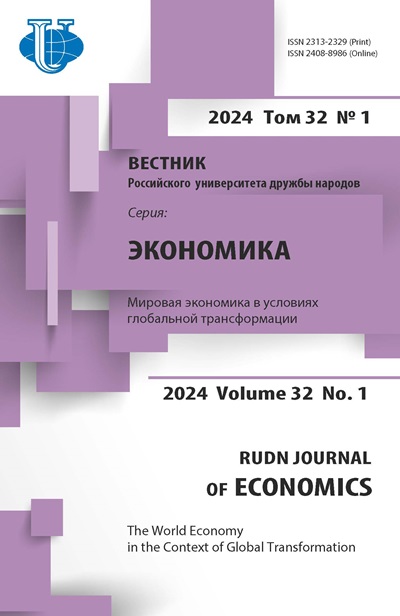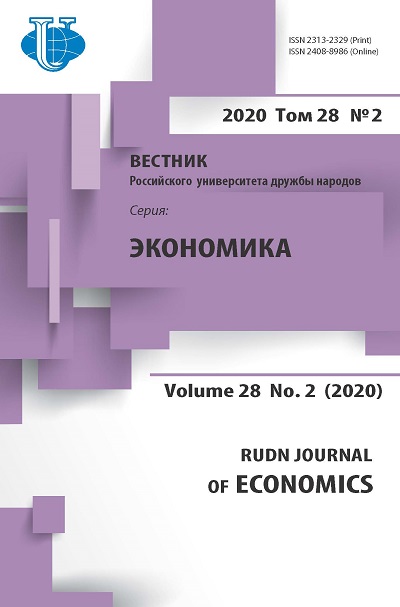Regulatory framework for attracting foreign investment in Venezuela’s oil and gas sector
- Authors: Chadaeva E.A.1
-
Affiliations:
- Peoples’ Friendship University of Russia (RUDN University)
- Issue: Vol 28, No 2 (2020)
- Pages: 402-413
- Section: Economic reviews and applied research
- URL: https://journals.rudn.ru/economics/article/view/23904
- DOI: https://doi.org/10.22363/2313-2329-2020-28-2-402-413
Cite item
Full Text
Abstract
The article analyzes the impact of the regulatory framework in the oil and gas sector of Venezuela. There are several factors affecting the volume and price of petroleum products in the world: investments in exploration and production of resources, the volume and depletion of reserves; political and economic crises in oil-producing countries; the creation of new technologies and much more, including state regulation of the oil and gas industry. Sometimes there are circumstances, the consequences of which are not thought. For example, Latin America has changed markedly since it began to use oil as a political tool. But, by the beginning of 2016, prices are falling: production volumes are high, and consumption is declining. There are several reasons: the decline in growth in developing countries; slow recovery of European countries after the European economic crisis; an increase in energy efficiency. To understand these changes in oil activities, it is necessary to examine the national and international legal framework. The regulatory framework in Latin America differs significantly from the American framework (the starting point is the type of subsoil ownership, i.e. in South America, subsoil is owned by the state by colonial heritage, and in the United States by private individuals). Thus, the subject of the study is the legal framework of Venezuela, a country with its own historical features, peculiar views on national security and ideological views on the role of the state. Venezuela will be considered, as the country is one of the major producing countries in Latin America; oil is the main element of the economy; a large number of regulatory models have been tested. The evolution of its activities is an excellent example of different approaches to the management of the oil industry.
About the authors
Elmira A. Chadaeva
Peoples’ Friendship University of Russia (RUDN University)
Author for correspondence.
Email: ak-4763@yandex.ru
postgraduate student of the Department of Ibero-American Studies
6 Miklukho-Maklaya St, Moscow, 117198, Russian FederationReferences
- Aidrous, I.A.Z. (2017). Razvitie neftehimicheskoj promyshlennosti Korolevstva Bahrejn [Development of the petrochemical industry of the Kingdom of Bahrain]. RUDN Journal of economics, 25(3), 367–380. (In Russ.)
- Alekseenko, O.A., & Pyatakov, A.N. (2019). Venesuela: ispitanie krizisom [Venezuela: the crisis test]. IBEROAMERICA, (2), 57–83. (In Spanish.)
- Astakhov, E.M. (2019). Yroki Venesuelskogo krizisa [Lessons from the Venezuelan crisis]. IBEROAMERICA, (2), 84–103. (In Spanish.)
- Espinasa R., & Sucre, C. (2015). Cheap Oil? Making Sense of a Competitive Oil Market (p. 24). Documento de trabajo del BID. Washington, D.C.: BID. (In Spanish.)
- Espinasa, R. (2016). Nuevo modelo, viejo precio [New Model, old price] (p. 29). Documento de trabajo del BID. Washington, D.C.: BID. (In Spanish.)
- Kholodkov, N.N. (2018). Latinskaya America: Problemi economicheskogo vosstanovleniya [Latin America: Problems of economic recovery]. IBEROAMERICA, (3), 33–56. (In Spanish.)
- La implosión de la industria petrolera venezolana. Retrieved November 19 2019 from https:// prodavinci.com/la-implosion-de-la-industria-petrolera-venezolana
- Lavrov, S.N., & Dykin, B.G. (2018). Rossija v mirovoj uglevodorodnoj jekonomike [Russia in the global hydrocarbon economy]. RUDN Journal of Economics, 26(3), 416–428. (In Russ.)
- Monaldi, F. (2015). Latin America’s Oil and Gas. After the Boom, a New Liberalization Cycle? Harvard Review of Latin America. Energy Oil, Gas and Beyond (pp. 2–7). Cambridge.
- Mortimore, M. (2009). Arbitraje internacional basado en cláusulas de solución de controversias entre los inversionistas y el Estado en acuerdos internacionales de inversión: Desafíos para América Latina y el Caribe [International arbitration based on Investor-State Dispute Settlement clauses in international investment agreements: Challenges for Latin America and the Caribbean] (p. 86). Santiago de Chile: CEPAL. (In Spanish.)
- Ojeda Kalluni, E., & Chadaeva, E.A. (2018). Jenergeticheskaja reforma v Meksike: Opyt i uroki dlja preobrazovanija jenergeticheskogo sektora stran Juzhnoj Ameriki [Mexico's energy reform: Experience and lessons of the energy sector transformation in South America]. RUDN Journal of Economics, 26(4), 609–619. (In Russ.)
- Rodríguez, P. (2006). Petróleo en Venezuela, ayer, hoy y mañana: Cinco décadas de historia [Oil in Venezuela, yesterday, today and tomorrow: Five decades of history] (p. 238). Caracas: Libros de El Nacional. (In Spanish.)
- Rozental, D.M., & Jeifets, V.L. (2018). Vneshnyaya politika Venesueli v nestabilnoy obstanovke [Venezuela's foreign policy in the situation of instability]. IBEROAMERICA, (4), 53–76. (In Spanish.)
- Tres escenarios sobre el desarrollo de la faja del Orinoco. Retrieved November 20 2019 from http://lasarmasdecoronel.blogspot.com/2015/10/tres-escenarios-sobre-el-desarrollo-de.html
- Yakovlev, P.P. (2019). Mirovoj rynok nefti: Rol' stran Latinskoj Ameriki [World oil market: The role of Latin American countries]. Russian foreign economic, (9), 110–124. (In Russ.)
- Zhukov, S.V., & Reznikova, O.B. (2018). Venesuela na mirovom rinke nefti [Venezuela in the world oil market]. World economy and international relations, 10(62), 80–90. (In Russ.)















